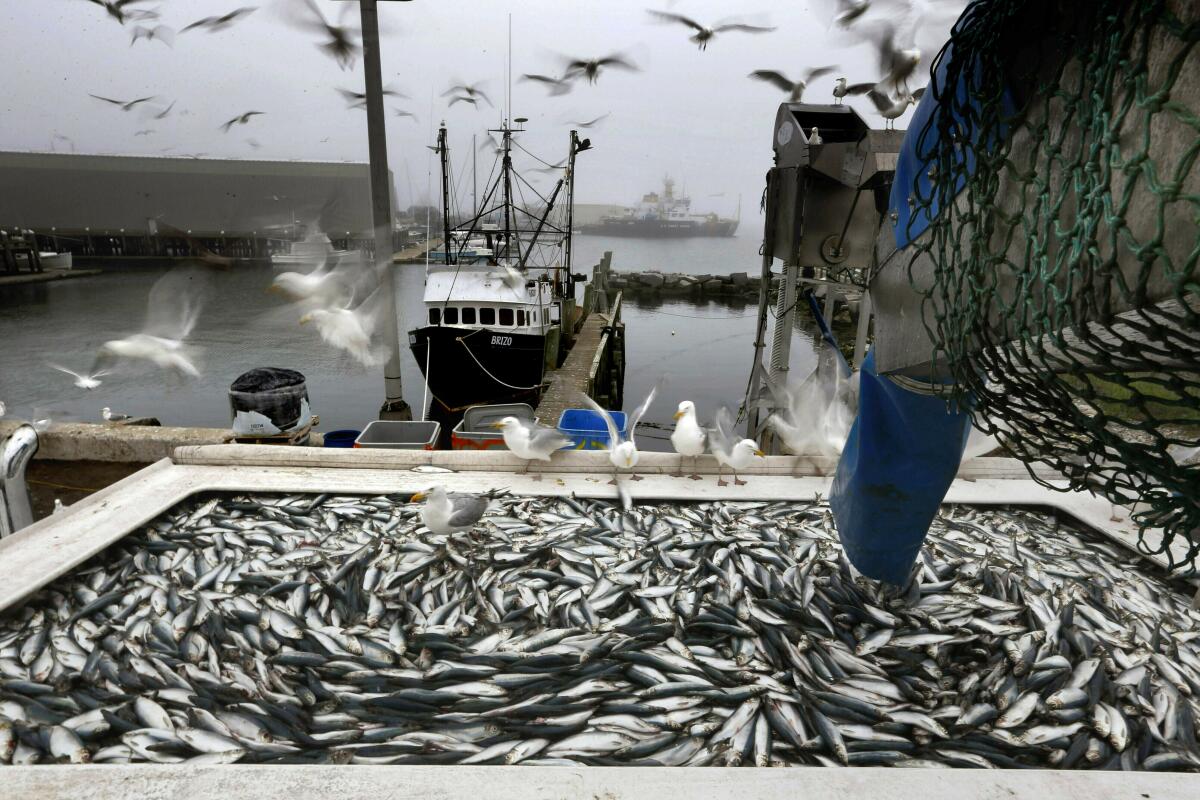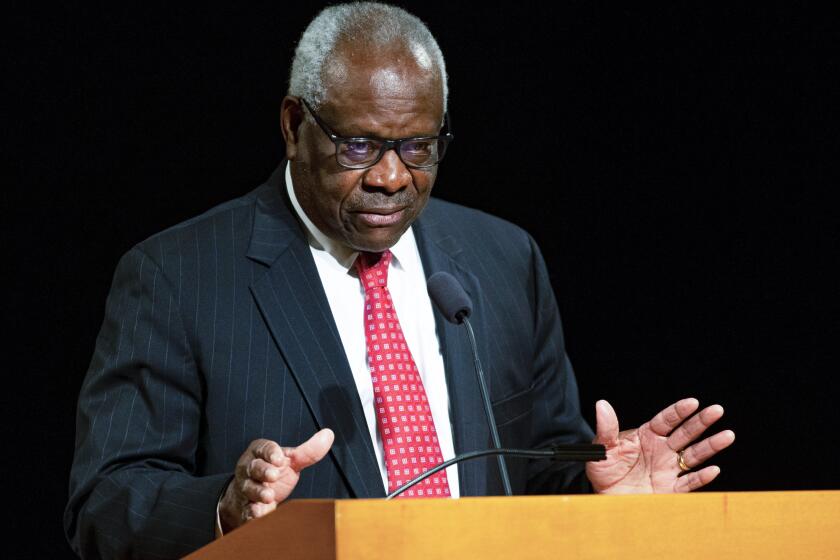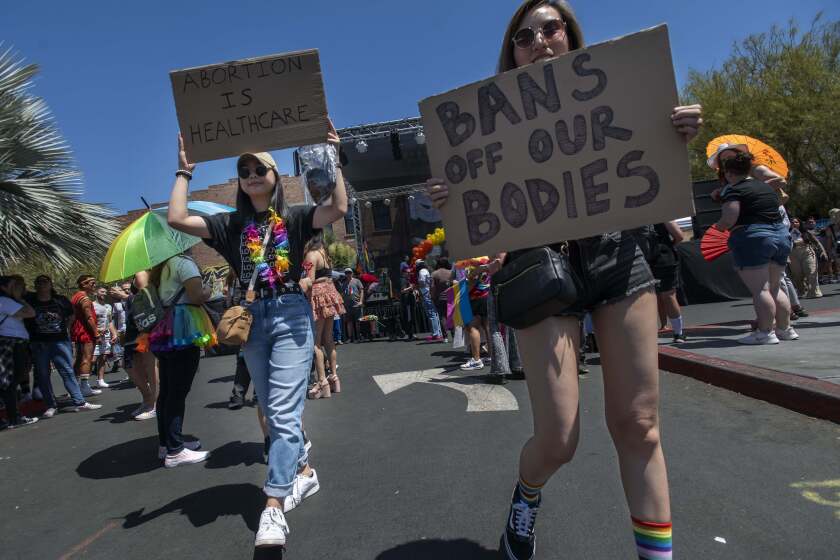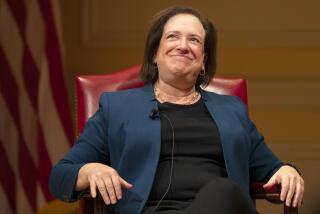Opinion: If the Supreme Court kills the Chevron doctrine, corporations will have even more power

On Monday, the Supreme Court agreed to hear a case that could well advance two long-term conservative causes: the war on government and the parallel war on science.
The court accepted Loper Bright Enterprises vs. Raimondo, an innocent-looking case involving herring fishermen and the requirement by the National Marine Fisheries Service that they pay the salaries of government monitors to ensure compliance with regulations that protect overfished and endangered species.
From little herrings, whale-sized consequences for our world might grow.
The petitioners seek to overturn or greatly limit a 39-year-old Supreme Court case, Chevron vs. Natural Resources Defense Council. That ruling said that if a federal law is silent or ambiguous on a specific question, courts should defer to government agencies’ interpretation of the statute.
How hard could it be for Clarence Thomas, the longest-serving Supreme Court justice, to figure out how to follow financial disclosure law?
That’s important because Congress, in enacting a law, can rarely if ever predict every situation that might arise in applying or enforcing it. So it must leave details for expert administrators to fill in.
Think about how the Environmental Protection Agency, created in 1970, has developed rules to combat the causes and harms of climate change, which were understood poorly if at all until decades later. Or how the Occupational Safety and Health Administration must adapt and develop rules to protect workers in industries that did not even exist at its birth in 1970.
Eliminating or curbing the power of federal agencies to interpret and enforce federal laws in rapidly changing circumstances, as the court is being asked to do, would implement a long-standing Republican agenda: to shrink government and return to the days of laissez-faire capitalism, before child labor laws and Social Security created a broad social safety net almost a century ago.
In recent years, as a gridlocked Congress enacts ever fewer laws, it has been largely left to federal agencies to enforce those laws in unforeseen situations.
With federal agencies crippled in playing that indispensable role, whole industries would be unleashed to operate free from mandates that protect clean air and water; banks and predatory lenders could operate unconstrained by requirements that protect consumers; and the wealthy and powerful would make their own rules.
The easiest way for powerful economic and political interests to weaken regulatory constraints is to denigrate scientific expertise and truth itself. And the best way for them to achieve that is to enable judges to substitute their personal opinions for the decisions of expert administrators charged with carrying out Congress’ objectives. Hamstringing the agencies opens the door to what Kellyanne Conway, former President Trump’s senior counselor, famously called “alternative facts.”
The Dobbs opinion will be devastating for American lives, and it will be derided by legal scholars.
Beyond that door lies great danger. As Tom Nichols wrote in “The Death of Expertise,” “know-nothingism,” amplified by social media, can render us helpless in solving complex problems — from climate change to deadly pandemics.
We’ve already seen the hazards of dismissing expertise. Even without overruling the Chevron case, last year the court prevented the EPA from adopting rules to keep industry from contributing to irreversible global warming. And last month, Texas U.S. District Judge Matthew Kacsmaryk, a Trump appointee, substituted his judgment for the Food and Drug Administration’s in evaluating the safety of abortion pills. Fortunately, that court ruling is now stayed, but it shows the dangerous direction in which judicial arrogance can take us.
Nobody can say for sure what the Supreme Court will do in the Loper case. But we can say this: There is nothing in the Constitution or in its history that justifies shifting the power to fill gaps in a statute from a government agency in the executive branch to the judiciary, provided courts retain the authority, as they do under the Chevron ruling, to prevent agencies from exercising powers not lawfully delegated to them.
The Chevron deference doctrine has worked tolerably well for four decades, and the case for changing it hasn’t been made. If the conservative justices choose to abandon the doctrine just because they have the votes, they will reinforce the message from Dobbs vs. Jackson Women’s Health Organization, the court’s abortion decision last year, that our reliance on precedent is out the window when it comes to the conservative majority’s agenda.
That will be one more reason why voters need to elect a president and a Congress in 2024 committed to redressing the judicial power grab by an increasingly right-leaning court working to undermine effective government that protects us all.
Laurence H. Tribe is the Carl M. Loeb University Professor of Constitutional Law emeritus at Harvard University. Dennis Aftergut is a former federal prosecutor, currently of counsel to Lawyers Defending American Democracy.
More to Read
A cure for the common opinion
Get thought-provoking perspectives with our weekly newsletter.
You may occasionally receive promotional content from the Los Angeles Times.








